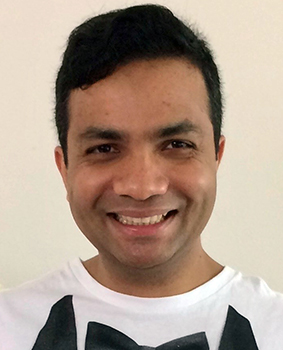
York researchers Anwar Ahmed and Brian Morgan investigate the role of memories that are passed down through generations and use of duoethnography to gain insight into pedagogical approaches to language instruction.
By Krista Davidson

Postmemory plays a critical role in shaping the identity of individuals who speak multiple languages, according to York researchers Anwar Ahmed and Brian Morgan. Postmemories are memories that are passed down from generation to generation, not experienced directly and are often so vivid, individuals feel as though they were experienced first-hand. Postmemories can impose painful associations of transitioning from a home country to a new country, where learning a new language is often required to integrate and obtain employment.
The paper, “Postmemory and multilingual identities in English Language teaching,” published in Language Learning Journal, examines the role of postmemory in multilingual identity through duoethnography, a unique methodology that enables Ahmed, an assistant professor with the Faculty of Liberal Arts & Professional Studies, and Morgan, a senior scholar at Glendon Campus, to collaborate on the research and writing through conversive dialogue in order to gain a deeper insight and understanding of the broader cultural context of multilingual identities.
In their paper, Ahmed and Morgan examine the strong link between postmemory and multilingual identity. The researchers propose that pedagogical approaches to language instruction be considered to minimize negative associations that may arise for multilingual students.
The research is particularly relevant given the mobile nature of the world today.
“In the last decade or so, there has been a glorification of multilingualism, and in general this is a positive thing, but at the same time we need to critically explore and understand what multilingualism might mean in a multicultural context,” says Ahmed. “The language that someone left behind might bring about trauma when faced with it in a different context.”
Duoethnography allows the team to reflect on how their own postmemories have shaped their identities.

“Duoethnography supports the kind of insights and divergent experiences we’ve both had,” explains Morgan. This research approach creates a space for Morgan, who grew up in a small Jewish community in Regina, Saskatchewan with a Ukrainian parent, and Ahmed, who emigrated to Canada from Bangladesh as an adult, to find similarities in their shared differences.
"What emerged through our dialogue was the recognition that language learning experiences in the past illuminated tensions,” says Morgan. “The language evoked not just a modality to express meaning but it had memory and postmemory of why our families came to Canada.
“Tracing our own stories, we were able to examine how even dialect can signal hierarchical power relations in one context. Even the sight of language evokes powerful memories,” he adds.
Ahmed and Morgan advise that language instruction is not designed to accommodate the complexities of multilingual identities, and for some, the presence of heritage language, even in street signs such as often found in Chinatown or Greektown, and language programs for children and adults, can lead to ambivalent feelings.
“Language signs are essentially window dressing that serve to advertise that a country is accepting of other languages without providing the substance that makes it a reality,” says Morgan. “It’s a huge problem with Indigenous languages in Canada. It’s unlikely that any instructional language program will build roots and have a communicative and expressive longevity in society if not given a meaningful purpose.”
The paper calls for new approaches for maintaining a contemporary function for language instruction, particularly for students learning English for Academic Purposes (EAP), who may be acquiring English language conventions and practices vital to attend university and get a degree. “In the future, we will see more movement as a result of climate change, economic or global crises, and a need for a better understanding of the link between memory or postmemory and multilingual identity will be crucial in education and in supporting multilingual students,” says Ahmed.
